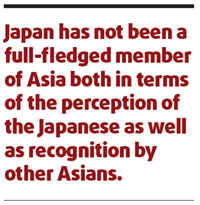Asian cooperation builds trust
By Kazuya Yamamoto (China Daily)
Updated: 2008-03-05 07:33
Updated: 2008-03-05 07:33
The deepening relationship between East Asian countries is often discussed in connection with the argument over whether we should create an East Asian Community.
However, the fact is that East Asian countries are increasingly linked with each other in various fields, and this trend is irreversible, regardless of our preferences for the formation of the regional community.

The Asian financial crisis of 1997 promoted the agreement of the Chiang Mai Initiative in 2000. The globalization of the economy has necessitated ASEAN+3 ministerial meetings not only in the fields of finance and foreign affairs but in labor, agriculture and energy.
On the other hand, the Democratic People's Republic of Korea's nuclear issue required the Six Party Talks in the region.
In other words, these movements illustrate that a large number of problems in the East Asian region can no longer be resolved by individual countries.
Therefore, our task is to steadily find solutions to these issues. We will be able to address the issues solely by multilateral collaboration without considering the possibility of and preferences for the formation of the East Asian Community.
This pragmatic or functional approach to East Asian regionalism implies that we cooperate at the time and situation where the concerned parties regard collaboration as necessary. Therefore, this approach does not appear to be confronted with difficulties.
However, the recent process of East Asian regionalism has witnessed obstacles that are not easily avoidable even if this moderate strategy is employed. The most typical of these problems is the emotional confrontation between Japan, China, and the Republic of Korea (ROK), caused by the Yasukuni problem during the Koizumi administration.
Resentment and rivalry between people are closely related to their perception of each other. I have been involved in several projects that attempt to clarify how Asians perceive each other and the region as a whole.
This research indicates that: (1) the Japanese are less inclined to consider that they belong to Asia than are other Asians; (2) the Japanese continue to regard their relationship with Asian countries as bilateral rather than multilateral.
In brief, Japan has not been a full-fledged member of Asia both in terms of the perception of the Japanese as well as recognition by other Asians - most importantly, East Asian countries such as China and the ROK.
Unfortunately, we cannot find a panacea for this situation. People's social awareness changes gradually depending on the circumstances surrounding them. The best policy for Japan to implement would be to steadily accumulate the multilateral cooperation that is required in various fields in order to address the changes caused by globalization.
Although this will not improve the situation overnight, it will gradually diminish our prejudice and restrain the futile competition between the governments. It will also diminish people's irrational reactions.
How can we best evaluate the current Japanese policy? First, the Asian policy of the Fukuda administration has improved Japan's relations with other Asian countries, China in particular.
On the other hand, Fukuda's visit to China last December impressed both the Japanese and Chinese, leading to a considerable improvement in their relationship.
Prime Minister Takeo Fukuda, father of the incumbent prime minister, once emphasized the importance of a heart to heart relationship between Japan and Southeast Asian countries. The current prime minister's approach has inherited this diplomatic style and will be useful in psychologically uniting the Japanese and other Asians.
Second, specific policies in the recent Japanese governments also appear to have been ameliorating the regional relations in East Asia. In the second and third East Asia Summits, Japan proposed a number of initiatives in areas such as human resources exchange, energy, environment, and measures against bird flu.
In order to address areas such as environmental protection and the prevention of bird flu, cooperation between countries is essential. The inevitable collaboration and human exchange will help build a deeper understanding between people as well as governments.
The problems that Japan has to manage with other Asian countries are bound to increase in the near future. An example of such problems is the gyoza dumpling incident. Japan and China have no alternative but to collaborate in the investigations in order to identify the cause of this regrettable incident.
Individual collaboration between Asian countries, including this case, may not always be successful. However, the accumulated experience in the necessary collaboration will steadily build trust among people of the region.
The author is assistant professor at Waseda University The Asahi Shimbun
(China Daily 03/05/2008 page10)
|
|
|
|
|
|